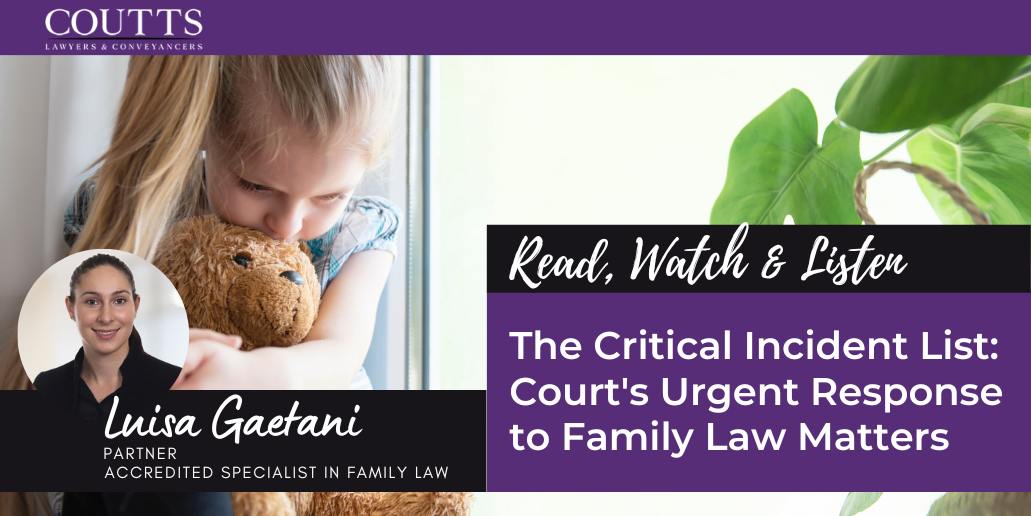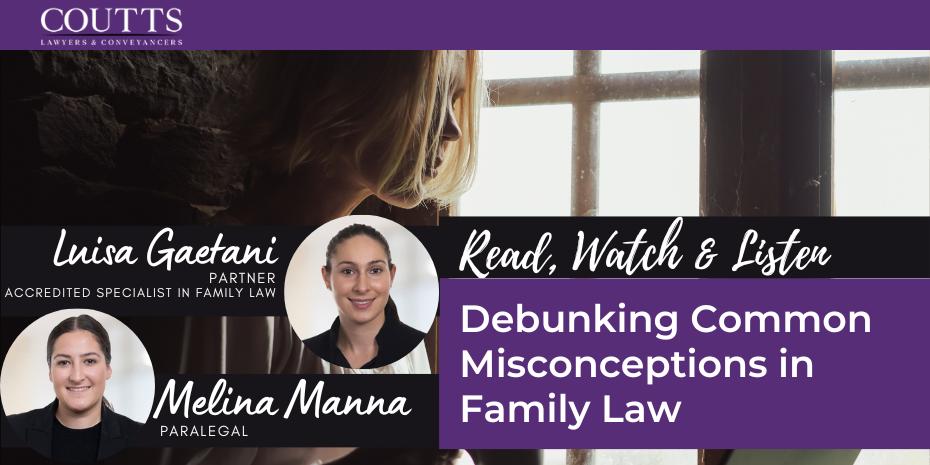KEY TAKE-OUTS:
- On 6 June 2022, the Federal Circuit and Family Court of Australia’s (FCFCOA) Critical Incident List commenced.
- This list allows successful applications to secure urgent Courts dates and orders regarding the parental responsibility of a child.
- To be eligible for this process, families must be experiencing extremely difficult circumstances such as, where the child/children have no parent available to care for them due to death, critical injury, or incarceration.
Family law, and in particular parenting matters, can be extremely complex and require urgent action. However, the Courts are forever inundated with matters relating to parenting and have since recognised a need to triage matters in certain circumstances. In response, the Court has commenced the ‘Critical Incident List’ that allows successful applications to secure urgent Court dates.
The list will only be available to matters that the Court deems require immediate action.
What is the Critical Incident List?
The Critical Incident List commenced at the FCFCOA on 6 June 2022 and aims to provide urgent attention to children there have no parent available to care for them due to death, critical injury, or incarceration as a result of family violence.
The orders made, because of the List, allows the applicant, a non-parent carer, to make decisions about the child’s schooling and living arrangements, as well as any health treatments that the child may receive.
The List draws support from the Court’s Family Violence Committee, who has advocated for an institutional response to the delays that are associated with the Court process and the impact this may have on a child’s development.
Justice Brasch, who is tasked with the matters on the List, has expressed the importance of this step for the Court “because the last thing we want is for aunts and uncles, grandparents, and best friends to have to come to court regularly. We need to get these families in and out (of the court) as quickly as possible so we can minimise the trauma for the surviving family.”
What are the application criteria?
To be considered for the Critical Incident List, the application must meet the following criteria:
- The applicant must be a non-parent currently caring for the child/ children.
- There must be no parent available to care for the child/children due to death, critical injury, or incarceration as a result of family violence.
- The applicant must be seeking orders for parental responsibility, allowing them to make appropriate arrangements for the child/children; and
- There must be no other final family law or state/territory child welfare orders in place which relate to the parental responsibility of the child/children.
How is an application made?
The National Assessment Team is responsible for receiving and assessing applications relating to the Critical Incident List.
As part of the application, the following documents must be provided:
- An Initiating Application, if there are no family law proceedings on foot.
- An Application in a Proceeding, if there are current proceedings.
- An Affidavit to support the application which outlines details supporting the grounds for the application; and
- A Notice of child abuse, family violence or risk.
In recognising the urgent nature of applications, the pre-action procedures, usually must be complied with and are suspended when lodging an application for the Critical Incident List.
Additionally, applications can seek an exemption from providing a section 60I certificate, stating family dispute resolution has been attended to on the basis of urgency.
How does it work?
In addition to receiving and assessing applications, the National Assessment Team is also responsible for administering the List.
If the Team determines that an application meets the criteria, the matter will be allocated a first listing date before a Judge, in Division 1 of the Court. This will occur within 7 business days, subject to the demand and availability of resources. Additionally, the National Assessment Team can make any necessary procedural orders.
If the application does not satisfy the criteria, the matter will be referred to:
- The Registrar on duty for listing.
- A Directions Hearing before a Judicial Registrar; or
- The relevant docket Judge, for hearing in the ordinary course.
If the application is made as part of existing proceedings that is being case managed by a Judge, the docket judge will be consulted and invited to mention the application within the required time.
The Family Law team at Coutts is well-equipped to assist you in navigating urgent family law matters, including those dealt with in the Critical Incident List. Please contact one of our experienced team to book an initial appointment.
ABOUT LUISA GAETANI:
Luisa is a Partner at Coutts Lawyers & Conveyancers and head of our Family and Criminal Law divisions. Since being admitted in 2014, Luisa has practiced solely in the areas of criminal and family law. It is her sensitive yet pragmatic approach that has allowed her to develop a strong rapport and build trusting relationships with her clients. Should a client’s matter proceed to court, Luisa has the skillset and experience to assist her clients through this process and where required, will draw upon her network of barristers to further benefit her client’s outcomes.
For further information please don’t hesitate to contact:
Luisa Gaetani
Partner
Accredited Specialist in Family Law
luisa@couttslegal.com.au
1300 268 887
Contact Criminal Lawyers Campbelltown today.
This blog is merely general and non-specific information on the subject matter and is not and should not be considered or relied on as legal advice. Coutts is not responsible for any cost, expense, loss or liability whatsoever to this blog, including all or any reliance on this blog or use or application of this blog by you.




